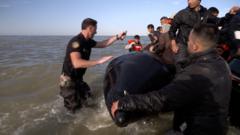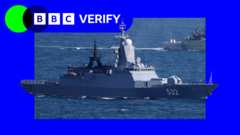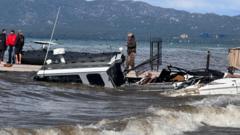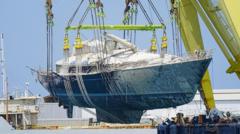Police actions reveal a shift in tactics aimed at combating illegal crossings of the English Channel.
French Police Take Unprecedented Steps to Thwart Migrant Crossings to UK

French Police Take Unprecedented Steps to Thwart Migrant Crossings to UK
Tensions rise as French authorities intervene directly in migrant boat situations off the coastal beaches.
In a dramatic incident off a beach south of Boulogne, French police took the rare step of entering the water to slash an inflatable boat filled with migrants attempting to cross the English Channel to the UK. The scene unfolded chaotically as men, women, and children onboard scrambled to safety when the boat, already struggling in the waves, was cut, resulting in a frantic escape.
The intervention marks a significant departure from usual procedures where, in the past, police have refrained from entering the water for safety reasons. Witnesses observed officers stripping off their body armor before rushing into the surf to act, indicating a potential shift in strategy as France grapples with increasing pressure to curb the flow of migrant crossings.
“We need to act,” one officer reportedly said, as he unwrapped a knife to cut the boat. Despite strict regulations typically limiting police action, authorities felt compelled to intervene amid a dangerous situation that posed a risk to the onboard migrants.
After the gendarmes lopped the inflatable boat, chaos erupted as the vessel deflated. A desperate and echoing cry from children onboard illustrated the perilous conditions that individuals were faced with during the attempt to cross.
Earlier, two large groups of individuals had moved towards the water, but the first boat intended for pickup was already overloaded—leaving many hopeful migrants waiting, desperate for the next opportunity. The situation escalated as additional boats approached, prompting a quick scramble as individuals tried to board.
Initially, police maintained a watching stance, adhering to policies that limited engagement except during rescue situations. However, as time passed and the scene became more hazardous, officers recognized the need for immediate action to avert further danger.
As police dismantled the boat, emotions ran high among those in the water. Once the vessel was rendered unusable, the migrants began retrieving their belongings, heading toward the dunes in hopes of returning to their temporary housing further north.
This incident has drawn attention from UK officials, who welcomed the intervention as a promising sign of cooperative efforts in managing the ongoing crisis at sea. The UK Prime Minister's spokesman underscored the need for decisive measures to address the situation, highlighting the urgency for joint action against migrant smuggling networks.
As France contemplates revising its approach to such maritime incidents, eyes remain on the evolving landscape of migrant crossings and the responses elicited by the ongoing humanitarian situation in the English Channel.
The intervention marks a significant departure from usual procedures where, in the past, police have refrained from entering the water for safety reasons. Witnesses observed officers stripping off their body armor before rushing into the surf to act, indicating a potential shift in strategy as France grapples with increasing pressure to curb the flow of migrant crossings.
“We need to act,” one officer reportedly said, as he unwrapped a knife to cut the boat. Despite strict regulations typically limiting police action, authorities felt compelled to intervene amid a dangerous situation that posed a risk to the onboard migrants.
After the gendarmes lopped the inflatable boat, chaos erupted as the vessel deflated. A desperate and echoing cry from children onboard illustrated the perilous conditions that individuals were faced with during the attempt to cross.
Earlier, two large groups of individuals had moved towards the water, but the first boat intended for pickup was already overloaded—leaving many hopeful migrants waiting, desperate for the next opportunity. The situation escalated as additional boats approached, prompting a quick scramble as individuals tried to board.
Initially, police maintained a watching stance, adhering to policies that limited engagement except during rescue situations. However, as time passed and the scene became more hazardous, officers recognized the need for immediate action to avert further danger.
As police dismantled the boat, emotions ran high among those in the water. Once the vessel was rendered unusable, the migrants began retrieving their belongings, heading toward the dunes in hopes of returning to their temporary housing further north.
This incident has drawn attention from UK officials, who welcomed the intervention as a promising sign of cooperative efforts in managing the ongoing crisis at sea. The UK Prime Minister's spokesman underscored the need for decisive measures to address the situation, highlighting the urgency for joint action against migrant smuggling networks.
As France contemplates revising its approach to such maritime incidents, eyes remain on the evolving landscape of migrant crossings and the responses elicited by the ongoing humanitarian situation in the English Channel.






















